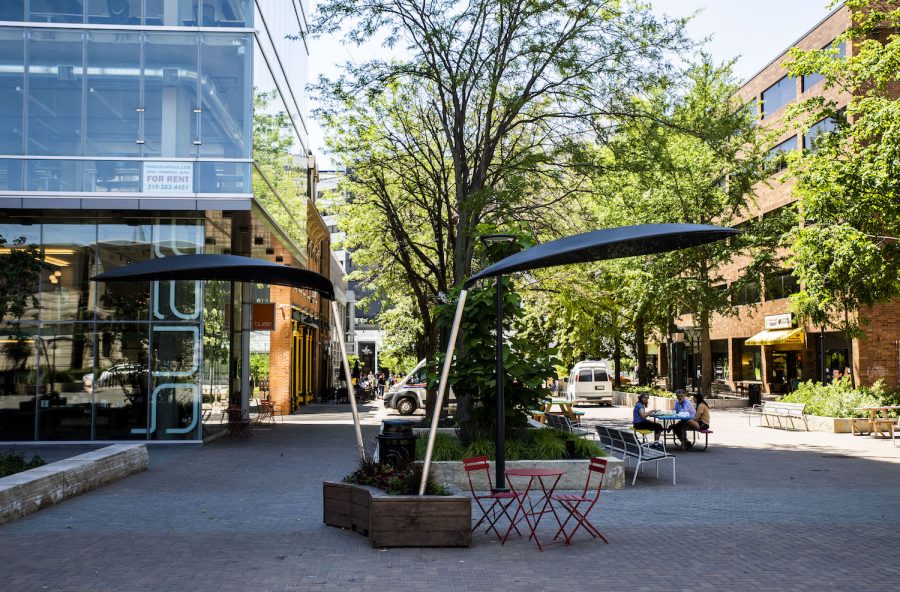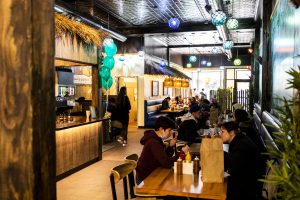Opinion | Prioritize people over cars
Iowa City needs to become more friendly to people instead of cars.
New shade structures at the pedestrian mall on Wednesday, June 16, 2021.The new shade structures are a collaboration between the Iowa City Downtown District, artist and architect Michael LeClare, Dan Kuenzi of City Construction Lacy Sexton of Sexton Design.
August 25, 2021
In order to make Iowa city more livable, it’s time to do away with parking minimums, or the number of parking spaces building needs.
The Iowa City Board of Adjustment has prioritized cars over people. A proposal for a mixed-use high-rise that would have provided 229 residential units and commercial space was recently rejected by the board in part because it did not have enough parking spaces.
From expansive lots to towering garages, it’s no secret that Iowa City has a plethora of unnecessary parking. If one were to develop an apartment complex downtown, they would have to construct about half a parking space per dwelling unit.
For example, if a complex has 200 units, they would need at least 100 parking spaces. Given that the average parking space is 330 square feet, about 33,000 square feet would be wasted on storing cars. There is obviously a better use for all this space.
For too long, Iowa City has allowed cars to dictate how cities are built. This is done at the sacrifice of the populace who are forced to use cars and pay exorbitant upfront and hidden costs, especially when it comes to parking, as an average parking spot in Iowa City can cost from 75 cents to $1.50 an hour.
While this may not seem like a lot, the cost can accumulate very rapidly for students on campus five days a week.
When Buffalo, New York, did away with parking minimums, the city was able to revitalize its downtown as parking lots were converted into walkable green spaces, business districts, and residential units.
In other words, city planners are giving up too much economic opportunity by choosing cars over people. Just imagine how much livelier Iowa City would be if we were to replace the hideous parking ramp on Burlington Street with a small public park or various shops and restaurants that cater to the college population.
Of course, there are those who believe that we need cars to survive. In a remark to the Iowa City Press-Citizen, Board of Adjustment member Mark Russo elaborated on his no vote on the aforementioned multi-use complex by explaining that students need cars to get groceries from stores like the Coralville Target.
This is where investing in public transportation comes in.
Aside from the fact that Target recently opened a downtown location specifically for students, Russo’s quote inadvertently provides some great commentary on the inadequate condition of public transport in Iowa City.
Iowa City has made an effort in improving public transport — a transit study conducted over the summer resulted in the city adding new routes and streamlining others.
But the city could be doing much more. Iowa City should work with Coralville and look to add more bus lines so that students wouldn’t need to bring their cars to get off campus. A robust public transit system is preferable to the car-centric system we have right now as it will cost less, provide more revenue for the city, and connect the city to other areas of the Iowa City metropolitan area.
Not to mention, when public transit is a primary mode of transportation, low-income communities have easier access to jobs. Finally, public transport encourages sustainability by decreasing pollution from vehicles. This will end up protecting the environment while also improving the livelihoods of Iowa City residents.
If Iowa City were to do away with parking minimums and make public transit a key part of our infrastructure, developers would have a lot more flexibility in what they can build. Thus, truly making Iowa City into one of the best towns in the country.
Columns reflect the opinions of the authors and are not necessarily those of the Editorial Board, The Daily Iowan, or other organizations in which the author may be involved.




